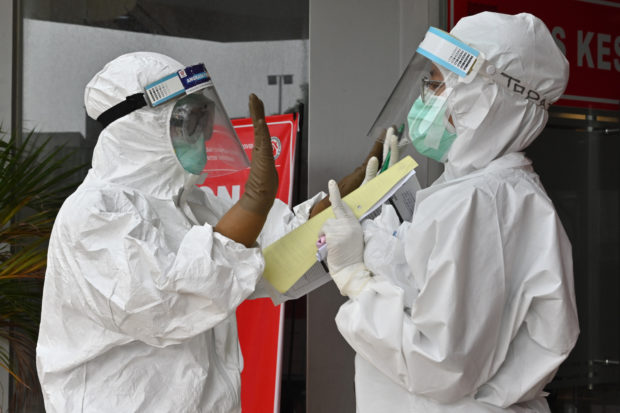Indonesia’s transition to new normal marked by people partying, avoiding tests, hijacking COVID-19 bodies

This picture taken on June 22, 2020 shows Indonesian doctor Carissa Putri, 25 (L) gesturing to a medical staffer from another hospital after receiving an incoming patient with light symptoms at a quarantine facility for COVID-19 coronavirus patients in Tangerang. AFP PHOTO
JAKARTA — Indonesia is facing an uphill challenge during a transition period towards a new normal in many cities as people joined crowds, disobeyed health protocols, and resisted mass testing for the coronavirus.
The national Covid-19 task force highlighted on Saturday (June 27) incidents ranging from people hijacking the body of a Covid-19 patient being transported by hospital staff to a gravesite, wet market traders shunning mass testing, to a nightclub urging customers to delete social media posts on a party the night before.
“Please take down every post ASAP and ask any friend of yours to also do the same! We count on you today so that we can all party again tomorrow,” read the appeal from Le Giant Pool & Bar that went viral and quickly caught the authorities’ attention.
More than a hundred family members and neighbors in Ambon city, Maluku province, on Friday (June 26) intercepted an ambulance – guarded by two police officers – carrying the body of a 58-year-old former parliamentarian en route to a designated gravesite for people with Covid-19.
The mob who overpowered the two police officers took out the corpse and left the coffin on the street.
Article continues after this advertisementIn another case in Surabaya, East Java, earlier this month, relatives of a woman who died of Covid-19 descended on a hospital morgue, picked up her corpse along with the hospital mattress and took her home.
Article continues after this advertisementMedical staff accompanied by hospital security officers who later visited the mourning family’s home to apply a Covid-19 burial procedure were told to leave.
Four sons and in-laws of the dead woman later tested positive for Covid-19 and were declared crime suspects by police over flouting criminal and health quarantine laws. They may face a jail term of at least five years.
“Cases of family members forcibly carrying off suspected Covid-19 bodies of their loved ones are one reason why the number of infections in East Java continued to increase,” National Covid-19 task force chief Doni Monardo said.
On Friday (June 26), East Java surpassed Jakarta’s number of total infections for the first time after the province, with a population of more than 40 million, recorded 10,901 total infections compared with the capital’s 10,796.
In Pekanbaru, Riau province, wet market traders, including those in Sukaramai centre, chose to close shop and go home when officers in hazmat suits went to conduct a mass swab testing. This also happened in other markets in other cities including Jakarta, where traders said they were worried they would be barred from working for weeks if they tested positive.
Riauonline news website reported on Friday that Riau province launched massive testing at traditional markets after local authorities detected the province was going into a second wave of coronavirus infections.
Based on the past week’s increment of cases, the second wave could be larger than the first that ended in mid-May, Riauonline reported, citing Mr Mulyadi, spokesman for Pekanbaru’s Covid-19 task force.
Earlier this week, the Jakarta administration suspended again a weekend car-free day on its main thoroughfare Thamrin-Sudirman, when residents get to bike and jog in the morning along the road, just when the event was reopened only the previous week. The weekly event had been closed since mid-March.
The administration made the decision, following reports of people congregating and forming large crowds when the event was held.
Cities and provinces across Indonesia, including Jakarta, have gradually moved to ease restrictive measures this month after the sprawling regions were placed under partial lockdowns. The country declared the first coronavirus infections in early March.
The deadly virus has infected 51,427 people, the highest number in South-east Asia, and killed 2,683 as on Friday.
During what is called the transition phase to a new normal, workplaces, places of worships and shopping centers have been gradually allowed to open with strict health guidelines, which include operating at 50 percent capacity and ensuring people maintain a 1 meter distance from one another.
For more news about the novel coronavirus click here.
What you need to know about Coronavirus.
For more information on COVID-19, call the DOH Hotline: (02) 86517800 local 1149/1150.
The Inquirer Foundation supports our healthcare frontliners and is still accepting cash donations to be deposited at Banco de Oro (BDO) current account #007960018860 or donate through PayMaya using this link.